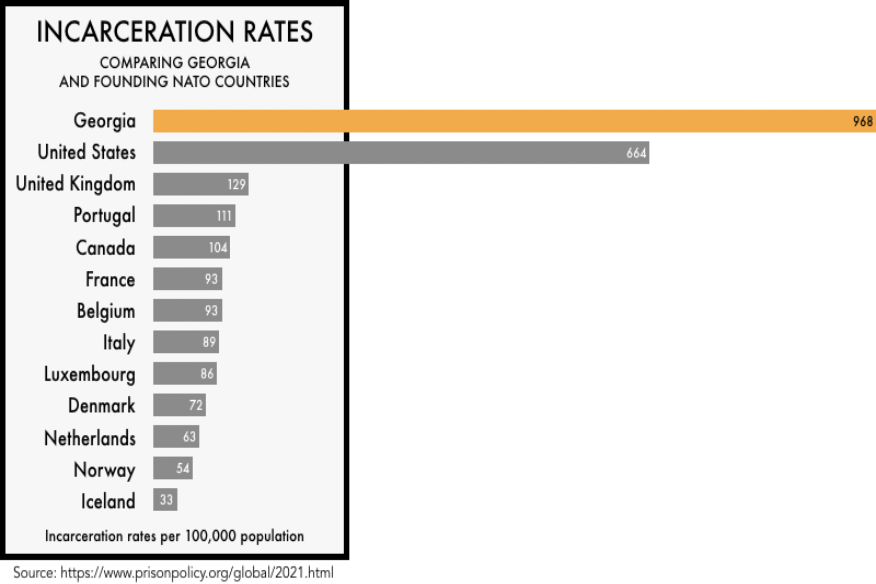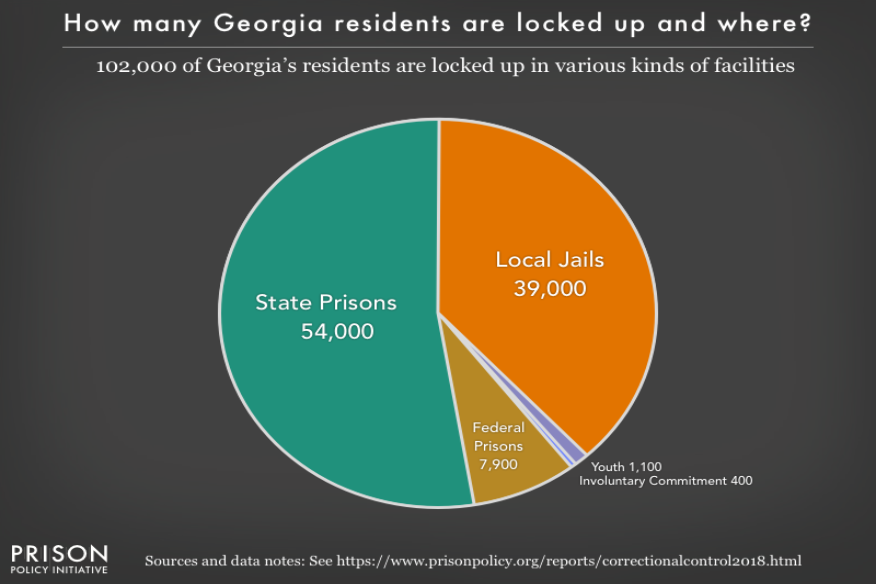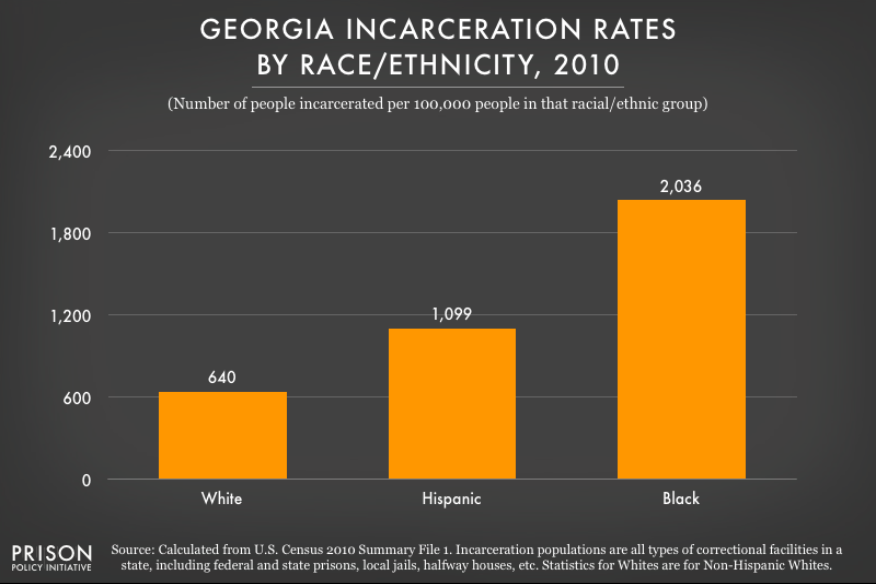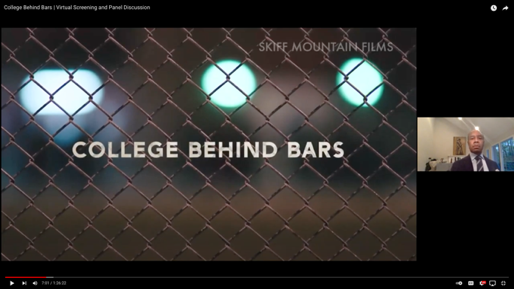The AYCGL Prison Education Initiative provides support to Morehouse faculty who teach humanities courses to incarcerated men and women in Georgia prisons. Georgia has one of the highest incarceration rates in the world; compared to founding NATO countries, the state of Georgia has incarcerations rates of 968 per 100,000 citizens (via-a-vis France @ 93, Portugal @ 111, Denmark @ 72 and the UK @ 129). Nationally, the United States has incarceration rates of 664 per 100,000 citizens. In Georgia, 102,400 people are locked up in various kinds of facilities: 54,000 in state prisons, 39,000 in local jails, 7,900 in federal prisons, and 1,500 in juvenile correctional facilities. The racial and ethnic makeup of the incarcerated population is disproportionate to the extreme: Black citizens are twice as likely as Hispanics and thrice as likely as Whites to end up behind bars in Georgia prisons.
The extrinsic or utilitarian benefits of higher education in prison are compelling. As a case in point, access to higher education drastically reduces recidivism rates: National rates of recidivism in the US are 76.6%; for those who receive college-level education, the rate drops significantly to 13.7%. Some sources cite “2 out of 3” released Georgians are back in prison within 5 years; recent data suggests that recidivism rates in Georgia are “now below 40%” within 3 years. For those students who complete the cycle of humanities courses associated with Common Good Atlanta, which began in 2008, GACHEP estimates that recidivism rates are below 1%. The 2020 Georgia Department of Corrections Impact Report claims: “For releases from 2011 to 2016, the recidivism rate for offenders who completed post-secondary courses was ZERO. Recidivism is calculated based on a three-year reconviction rate.” Reducing incarceration in general and recidivism rates in particular increases economic productivity, it enhances civic engagement, and it can also restore families as well as improve entire communities.
Most importantly, prison education is intrinsically valuable because it honors the human dignity of the incarcerated person and because it provides a restorative path to psychosocial transformation. Mr. Patrick Rodriguez, who directs the Georgia Coalition for Higher Education, an alumnus of the Common Good Atlanta program, says that “participating in higher education programs while incarcerated creates a sense of identity beyond what they are given once they are arrested and then convicted of a crime.” And while our carceral system “is not conducive to the growth of the person,” Rodriguez claims that “identity can be restored and developed by exploring the educational opportunities in prison.” Whether inside or outside prison walls, whether in our classrooms in Sale Hall or well beyond the borders of Morehouse, e.g., at Burruss Correctional Facility or the Downtown Reentry Program, faculty at Morehouse strive to create what our colleagues from the JAMII Sisterhood call “emancipatory spaces.”
The AYCGL is slowly but steadily expanding the involvement of Morehouse faculty and students in prison education. During the 2020/2021 academic year, AYCGL-sponsored faculty taught six humanities courses; we plan to expand our course offerings in 2022. In addition to the humanities classes we presently offer, the AYCGL will also pilot a series of academic workshops for incarcerated students at Metro Prison in 2022. Students at Morehouse are peripherally involved in this Prison Education Initiative in the form of ‘letters of encouragement’ and ‘essay exchanges.’ Prison education faculty teaching affiliates for 2021/2022 include Drs. Corrie Claiborne, Stephane Dunn, Keith Hollingsworth, Natasha Howard, Adrienne Jones, Kipton Jensen, and Winfield Murray, Esq. Our faculty teach humanities classes at Burruss Correctional Facility, METRO Prison and Reentry, and the Downtown Reentry Program.
@ BURRUSS: During the past year, Corrie Claiborne and Winfield Murray taught at Burruss. In their teaching evaluations, one of our students from Burruss wrote: “As men and women who are caged like zoo animals, an education is an important reminder that our minds are something they cannot take from us. Dr. Claiborne and Professor Murray are passionate educators who have reminded me that I am a human – regardless of what the State says I am.” Claiborne’s literature class started with the Negro Speaks of Rivers and ended with reflection papers on what reading literature meant to the students. In her comments to one of those reflection papers, Dr. Claiborne wrote: "I would say that your experience matters. You are not too old to talk about how your journey might have taken you in a different direction. I think about Sam Cook’s lyrics in “A Change is Gonna Come” and what they add to Langston Hughes images about rivers. Cook says, “and just like the river, I’ve been running ever since.” The journey is not over. I enjoyed having you in class." Winfield Murray, Esq., who serves as the site manager at Burruss, taught his signature class on Constitutional Law and Race in 2021. When asked about his experience at Burruss, Murray says: “As a professor, teaching those directly impacted by incarceration has had a profound impact on the way I teach and in what I expect from my undergraduate students. I now expect more than I ever did previously because the students in the prison education initiative shattered every expectation I previously held. There are simply no limits to what a student can achieve when they are committed to education.”
@ METRO: In southwest Atlanta, at Metro Prison, Keith Hollingsworth and Stephane Dunn taught well-received classes in the History of Black Entrepreneurship (Hollingsworth) and Creative Writing (Dunn). When asked about their experiences at Metro, Dr. Dunn said: "As much as it may have been [I hope], a memorable, impactful experience for my Metro students, teaching the class was a hundred-fold that for me. Together, we created a safe space for learning about the power of storytelling as a tool for self and social transformation and for the vulnerability and truth that is so integral to it. I love that now we share a story." Hollingsworth reported that his prison education students were very engaged: “these students brought different perspectives than I normally get from our Morehouse students and provided interesting insights to the material. Hollingsworth added that “the restrictions of teaching in this environment challenged me to consider my class in a new way.”
In October 2021, the AYCGL sponsored a webinar entitled COLLEGE BEHIND BARS: here. One of the panelists, Mr. Giovannie Hernandez, was featured in the College Behind Bars documentary produced by Netflix. Mr. Hernandez was interviewed by Oprah Winfrey Scholar, Mr. Jedediah Grady, in this More Conversations podcast: here. On March 2, 2022, the AYCGL will convene a second panel discussion, in-person and online, focused on the many challenges of reentry. For this second session, the panel will include Mr. Jule Hall, who was featured in the CBB documentary, and several of our community partners who provide reentry services.
The Prison Education Initiative is presently coordinated within the AYCGL by Kipton Jensen and Sinead Younge. Our community partners include Common Good Atlanta, Georgia Coalition for Higher Education in Prisons, and the Georgia Department of Corrections. Our prison education faculty are also working with the JAMII Sisterhood on their “Project Freedom.” Our blog entry from 2021 can be found here. Statistics cited here on incarceration rates in Georgia and elsewhere in the US can be found at www.prisonpolicy.org.



______
Kipton E. Jensen is an associate professor of philosophy and the director of the Leadership Studies Program in the Andrew Young Center for Global Leadership at Morehouse College. His latest book is Howard Thurman: Philosophy, Civil Rights, and the Search for Common Ground (University of South Carolina Press, 2019).
